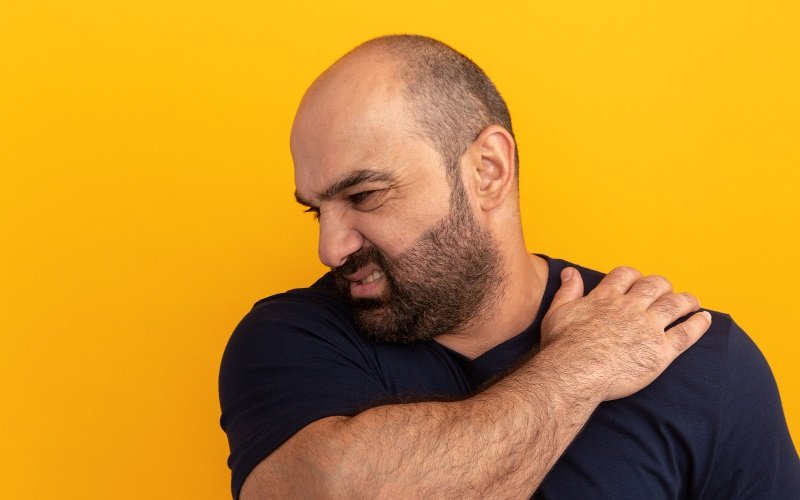Thawing the Freeze: Exploring the Best Treatments for Frozen Shoulder Pain
Frozen shoulder, also known as adhesive capsulitis in medical terms, is a debilitating condition that stands distinguished by stiffness, pain, and limited range of motion in the shoulder joint.
This condition can significantly impact your day-to-day activities and quality of life, making effective treatment crucial for restoring mobility and removing pain.
While frozen shoulders can be challenging to manage, a multidisciplinary approach combining various treatment modalities holds the key to successful outcomes.
Let us explore some of the best treatments for frozen shoulder pain, empowering individuals to overcome this challenging condition and regain optimal shoulder function.
1. Physiotherapy:
Physiotherapy plays a central role in the management of frozen shoulders, focusing on restoring range of motion, improving flexibility, and strengthening the muscles surrounding the shoulder joint.
A skilled physiotherapist designs a customized exercise program that incorporates gentle stretching, mobilization techniques, and strengthening exercises to address stiffness and pain while promoting gradual improvement in shoulder function.
Consistent participation in physiotherapy sessions, along with home exercises, is necessary to achieve optimal outcomes in the treatment of frozen shoulders.
2. Joint Mobilization and Manual Therapy:
Joint mobilization and manual therapy techniques are valuable adjuncts to physiotherapy in the treatment of frozen shoulders.
These hands-on treatments, performed by trained healthcare professionals, aim to mobilize the stiffened shoulder joint and surrounding soft tissues, promoting improved range of motion and pain relief.
Techniques such as passive stretching, mobilization with movement, and soft tissue massage help in breaking down adhesions, lowering down the levels of inflammation, and restoring optimal joint mechanics, facilitating a quicker healing from frozen shoulders.
3. Corticosteroid Injections:
Corticosteroid injections are commonly used to provide short-term pain relief and lessen the levels of inflammation in individuals dealing with frozen shoulders.
Administered directly into the shoulder joint under ultrasound or fluoroscopic guidance, corticosteroid injections help alleviate pain and swelling, allowing for improved mobility and function.
While corticosteroid injections can provide temporary relief, they are often used in conjunction with physiotherapy and other treatments to maximize effectiveness and promote long-term recovery.
4. Nonsteroidal Anti-Inflammatory Drugs (NSAIDs):
Nonsteroidal anti-inflammatory drugs (NSAIDs) may be recommended to remove the pain intensity and reduce inflammation levels that concern frozen shoulders.
These medicines can help in managing symptoms and improving comfort levels, particularly during the early phases of treatment.
However, NSAIDs are typically used as part of a comprehensive treatment plan and should be taken under the guidance of a healthcare professional to minimize potential side effects and ensure optimal pain management.
5. Hydrodilatation (Hydrodilation):
Hydrodilatation, also known as hydrodilation or distension arthrography, is a minimally invasive procedure used to treat frozen shoulders by stretching the capsule of the shoulder joint and breaking up adhesions.
During hydrodilatation, a combination of sterile saline solution and corticosteroid medication is injected into the shoulder joint under fluoroscopic guidance, causing the joint capsule to expand and stretch.
This procedure can help improve range of motion and lower down the levels of pain in individuals with frozen shoulders, particularly those who have not responded to conservative treatments (non-surgical approaches).
6. Manipulation Under Anesthesia (MUA):
Manipulation under anesthesia (MUA) is a procedure performed under anesthesia in which a trained healthcare provider (orthopedic doctor or joint replacement specialist) manipulates the shoulder joint to break up adhesions and scar tissue, thus improving range of motion.
MUA is typically reserved for individuals with severe frozen shoulders who have not responded to conservative treatments such as physiotherapy and corticosteroid injections.
While MUA can be effective in restoring shoulder function, it carries some risks and is usually performed in conjunction with post-procedure physiotherapy to maintain gains in range of motion.
7. Surgical Treatments:
In rare cases where conservative treatments fail to provide relief, surgical treatments may be considered for the treatment of frozen shoulders.
Surgical options include arthroscopic capsular release, where the tight capsule surrounding the shoulder joint is surgically released to make better the mobility factor, and manipulation under anesthesia (MUA) with capsular release.
Surgical treatments are typically reserved for individuals with severe and refractory frozen shoulders and are considered only after conservative treatments have been exhausted.
Conclusion:
Frozen shoulder is a challenging condition that is distinguished by various symptoms such as stiffness, pain, and limited range of motion in the shoulder joint.
However, with the right combination of treatments and a multidisciplinary approach, individuals can overcome the challenges posed by frozen shoulders and regain optimal shoulder function.
From physiotherapy sessions and joint mobilization to corticosteroid injections and minimally invasive surgical procedures, a comprehensive treatment plan customized as per the individual’s needs holds the key to successful results in the management of frozen shoulder pain.
If you or someone you know is experiencing symptoms of frozen shoulder, consult with your orthopedic doctor or joint replacement surgeon in India with immediate effect for proper evaluation and personalized treatment recommendations.
With dedication, patience, and perseverance, individuals can thaw the freeze and reclaim mobility, comfort, and quality of life in their shoulder joint.
For more information or queries, please consult the best shoulder pain doctor in Delhi near you and get all your answers.
internal link – atzworld








